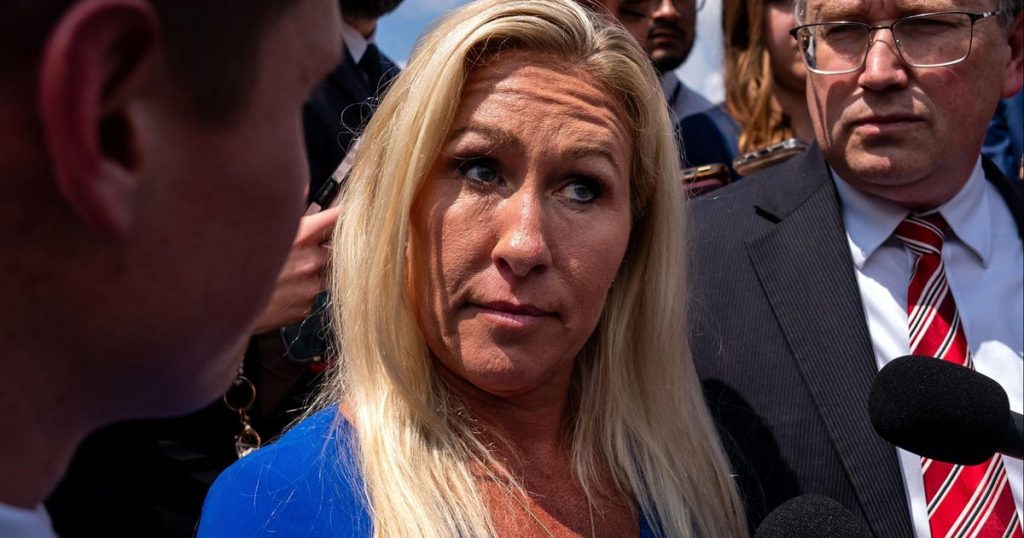In a significant development for Georgia’s political landscape, Rep. Marjorie Taylor Greene announced on Friday that she will not be competing in the upcoming Senate race. This decision has reshaped the Republican strategy aimed at unseating Democratic Sen. Jon Ossoff, particularly following Governor Brian Kemp’s recent withdrawal from the running. With GOP hopes high for this pivotal seat, questions arise about the implications of Greene’s absence and the remaining candidates vying for the nomination.
| Article Subheadings |
|---|
| 1) Greene’s Announcement and Its Implications |
| 2) The Landscape of the Georgia Senate Race |
| 3) Recent Polling Trends in Georgia |
| 4) The Role of GOP Leadership in the Race |
| 5) Future Political Aspirations for Key Figures |
Greene’s Announcement and Its Implications
On Friday, Rep. Marjorie Taylor Greene confirmed via social media that she will not seek a Senate seat in the upcoming 2024 elections. Her post criticized Senate Republicans, expressing disappointment with the party’s cohesion and direction, stating, “I won’t fight for a team that refuses to win.” Greene, a prominent supporter of former President Donald Trump, has been a highly polarizing figure within her own party, often engaged in conflicts with GOP leadership. Her withdrawal marks a pivotal moment for Republicans, as they had hoped her association with Trump would galvanize support in a state that has seen close electoral races in recent years.
The Landscape of the Georgia Senate Race
The race for the Georgia Senate seat has become increasingly important for both major political parties. The Republican agenda is focused on evicting Sen. Jon Ossoff, who narrowly won his seat in a special runoff election in 2021. Following Greene’s announcement, the Republican field appears to be open, particularly after Governor Brian Kemp, previously seen as a leading contender, opted against running. With Greene out of contention, the GOP must reevaluate its strategy to secure the seat, which could greatly influence Senate control.
Recent Polling Trends in Georgia
Recent polling has painted a concerning picture for Republicans. A poll conducted by the Atlanta Journal-Constitution last month indicated that Ossoff led Greene 54% to 37%. In contrast, Kemp, who does not plan to run for Senate, showed a competitive edge over Ossoff with a slim lead of 49% to 46%. These numbers suggest that the GOP may experience significant challenges in reclaiming this critical seat without a compelling candidate. Greene’s public image, characterized by her confrontational rhetoric, also factored into her decision to step back, as her numbers against Ossoff lagged compared to potential competitors.
The Role of GOP Leadership in the Race
The dynamics of the GOP leadership are also critical to the Georgia Senate race. Governor Kemp, although stepping aside, remains a powerful figure with considerable influence in the party. His decision garnered attention not only because he was viewed as a serious contender but also due to the implications it holds for the Republican strategy moving forward. Discussions have surfaced regarding leadership roles within the party and how they might affect candidate selection. As the party navigates this pivotal election season, maintaining unity and strong leadership will be essential for driving voter turnout, particularly given Georgia’s recent voting trends toward Democrats.
Future Political Aspirations for Key Figures
The future political landscape for influential figures such as Governor Kemp and Rep. Greene remains uncertain. Despite his exit from the Senate race, there are indications that Kemp may have greater aspirations within the party, possibly eyeing a higher office or a different role within the state’s politics. Meanwhile, Greene has established herself as a significant fundraiser and ally of Trump, leading to speculation about her future political maneuvers. The evolving scenario points to a deeper examination of leadership dynamics within the Republican Party in Georgia, as they set their sights on upcoming elections.
| No. | Key Points |
|---|---|
| 1 | Rep. Marjorie Taylor Greene will not run in the Georgia Senate race. |
| 2 | Greene criticized Senate Republicans in her announcement, voicing discontent with party strategies. |
| 3 | Governor Brian Kemp’s decision not to seek the nomination leaves an open field for GOP candidates. |
| 4 | Polling indicates a competitive edge for Ossoff over both Greene and Kemp. |
| 5 | Future aspirations of key Republican figures may impact the political landscape in Georgia. |
Summary
The withdrawal of Rep. Marjorie Taylor Greene from the Georgia Senate race represents a turning point for Republican efforts to reclaim a critical seat held by Sen. Jon Ossoff. With Greene’s candidacy seen as a potential advantage due to her alignment with Trump’s base, her decision not to run leaves the GOP’s strategy in flux. As candidates emerge in this pivotal race, the implications for both parties will continue to unfold, shaping the political landscape in Georgia and influencing broader Senate control.
Frequently Asked Questions
Question: Why did Marjorie Taylor Greene decide not to run for Senate?
Greene indicated her decision was influenced by her frustrations with Senate Republicans, stating she will not align with a team that she feels is failing to win.
Question: Who are the leading candidates for the Georgia Senate seat now?
Currently, the Republican field is open, especially following Governor Kemp’s decision not to run. Rep. Buddy Carter has announced his candidacy, presenting himself as a close ally of Trump.
Question: How important is the Georgia Senate race for both parties?
The Georgia Senate race is vital as Republicans aim to expand their majority in the chamber, while Democrats seek to retain control. Given the competitive history in the state, both parties recognize its significance in future legislative strategies.


